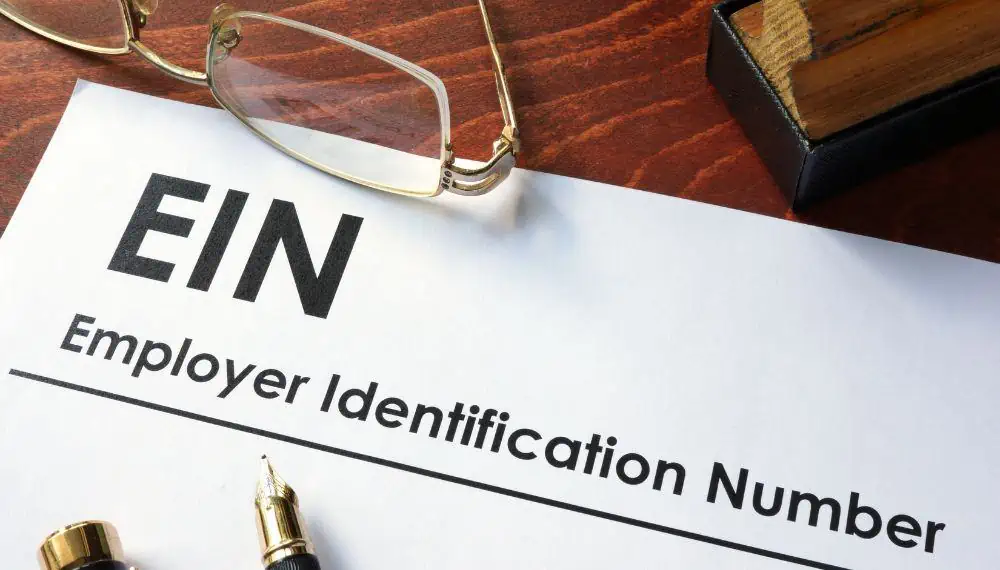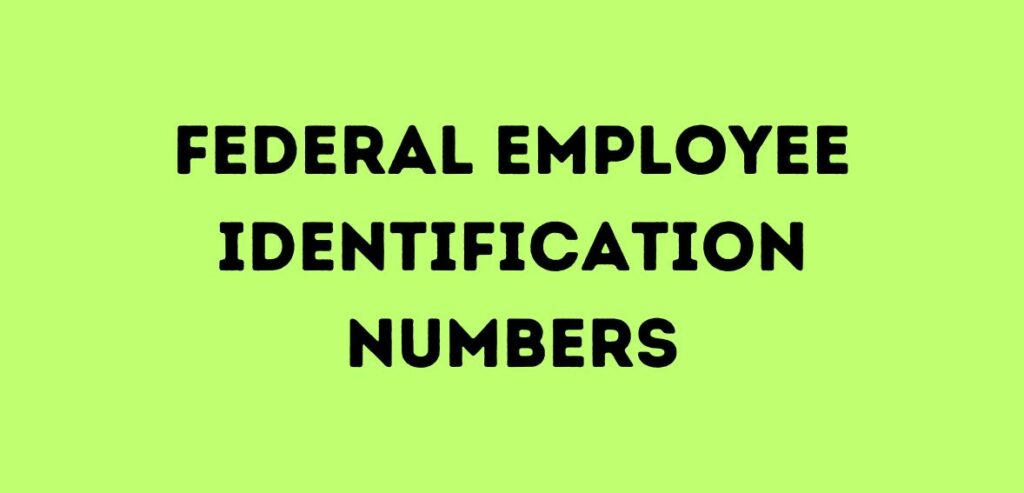There is actually no difference between FEIN vs EIN, they are the same. You can consider it as the business equivalent of a SS number. You’ll need this number for essential business operations in the USA, such as managing payroll and income taxes, applying for company credit cards, payment processing, and securing loans or employees. This “ID” serves as the foundation of your business when dealing with financial institutions, government agencies, and other organizations.
The majority of businesses in the USA require EIN or FEIN, with a few exceptions. Let us explore further to understand the factors that might influence your eligibility.
Understanding FEIN Vs EIN
FEIN or Federal Employee Identification Numbers are commonly referred to as your business tax ID. They are used interchangeably. The IRS assigns this number to businesses for tax related purposes. It is important to note that FEIN is different from an employer’s state ID number.
Once the IRS provides you with FEIN it becomes your tax ID number unless you make changes to your business entity or close your account. The FEIN is a type of TIN that most businesses utilize although some may use identifiers such, as SSNs or ITINs. It’s a unique, nine-digit number that identifies businesses operating within the United States. The format for the federal tax identification number follows the **–******* structure.

When completing paperwork like the form the Form 941 and business tax returns it is essential to include your business identification details. These forms will require your EIN. It is advisable to keep your business ID number securely stored for access whenever necessary and to ensure recording on your tax documents.
Is a Federal Tax ID Number necessary for my business?
For almost all types of business organizations, including partnerships, sole proprietorships, LLCs, corporations, estates, trusts, and nonprofits, obtaining an EIN is essential.

- Corporations:
Whether your business is taxed as “S Corporation” or “C Corporation,” having an EIN is a must.
Additionally, if a partnership or LLC chooses to be taxed as “S Corporation” or “C Corporation” under the IRS rules, it will also require an EIN.
- LLCs:
If an LLC has more than two owners it is necessary to have an EIN of whether the LLC is classified as a partnership for taxation purposes or chooses to be taxed as a C corporation or S corporation.
However, if an LLC has one owner the IRS treats the LLC as disregarded. This means that all income, loss and deductions are reported on the owner’s income tax returns, similar to how a sole proprietor reports them.
- Sole Proprietors:
If you operate as a proprietor without any employees the IRS generally allows you to use your tax ID, such as your SSN as your FEIN. However, obtaining a business EIN can still be advantageous for various reasons. It helps prevent payment delays or complications when dealing with clients who prefer using an EIN for business transactions of an SSN.
Furthermore, some banks may require an EIN in order to open a business checking account. Using an EIN as a proprietor can enhance credibility. And protect the privacy of your SSN. The IRS requires a proprietor to have an EIN if they have employees or are involved in a Keogh plan or obligated to file excise duty returns.
Information Required Before Applying For EIN
When applying for your business’s EIN, you’ll be required to provide specific information, including:
- Provide the name and address of the individual or organization for which you are requesting an EIN. If applicable include the trade name (also known as DBA name).
- Provide the name of the party along, with their tax ID. This individual tax ID typically has the authority to manage your business and its assets and funds.
- Please indicate the type of entity your business falls under (proprietorship, corporation) and provide either the date it was established or acquired.
- Specify your reason for applying such, as hiring employees starting a business changing entity type or acquiring an existing business.
- Take estimate of how many employees you will be hiring in next 12 months. Additionally state it if you will be paying employment taxes (quarterly or annually, if required) and provide the date of your wage payment.
- If your business is structured as an LLC you would be required to state how many members are involved.
- Lastly, select the category that best describes your business activity from the provided list. Some options include food service, manufacturing, construction, healthcare, finance or insurance, retail, rental or leasing services. Additional services include –
- Real estate management,
- Transportation services,
- Wholesale brokerage,
- Warehousing,
- Any other relevant category.
Step By Step Process Of Applying For EIN
Getting an EIN is a complimentary service provided by the IRS. Follow these simple steps to apply:
Step 1 – Go to the IRS website and indicate your business entity’s legal and tax structure. On the EIN online application page, you’ll find clear information about the eligibility requirements and time limits. Simply click the “Apply Online Now” button.
You can apply as any of the following:
- LLC
- Trust
- Corporation
- Estate
- Sole proprietor
- Partnership.
Step 2 – Provide details about the members if your business functions as an LLC, and explain the rationale behind your request. You’ll need to mention the state where your LLC is based and the number of members involved.
For a single-member LLC, the IRS may initially categorize your business as a disregarded entity. For multi-member LLCs, the IRS generally considers them as partnerships during their initial review. You can choose from the following options to clarify your reason for obtaining an EIN:
- Bought a new active business
- Modified your organization’s type
- For banking purposes
- For employee hiring
- Establishment of a new business.
Step 3 – Identify the person responsible for handling the company’s tax matters. You may be required to provide their name along with either their SS number or ITIN.
Step 4 – Share details about your business, including any related address and contact number. You’ll be required to furnish the business entity’s name, trade name (if required), and the date it commenced operations. Ensure that the legal name aligns with the articles of formation, and exclude any corporation name endings.
Step 5 – Please answer a series of questions regarding taxes. The application will ask about alcohol, tobacco, firearms, quarterly federal excise tax returns, gambling, and vehicles. Most people typically answer “no” to these questions. After that, you will be presented with a list of business categories that indicate the type of your business.
If you can’t find a category that fits, you can select “other” to see additional options. And if none of those options work either, you can choose “other” again and manually enter your response.
Step 6 – You can select how you want to receive your EIN confirmation from the IRS. They usually offer two options: mail delivery or an online platform. If you choose mail delivery, it can take up to four weeks to receive the confirmation letter. On the other hand, using the online method will give you instant access to the confirmation letter. As a final step before submitting your application, make sure to review all the information you provided and ensure its accuracy. It’s crucial to double-check everything before completing the process.
![]() Recommended reading: How to Get An EIN Number for Your Business?
Recommended reading: How to Get An EIN Number for Your Business?
Conclusion
To ensure your business is on the right track, it’s crucial to carefully consider essential aspects and complete any required documentation.
Typically, obtaining an EIN should be one of the primary tasks on your checklist as you launch your business. With this simple guide, you may have a clear understanding of the difference between EIN and FEIN, furthermore, with step-by-step guide, you can easily apply for one!
Frequently Asked Questions
Q: What Is an Employer Identification Number (EIN)?
An EIN, also known as FEIN, is necessary for the IRS to identify your business and manage its tax responsibilities. You might also require it to open a business bank account or credit card.
All corporations, partnerships, and businesses with employees must obtain an EIN to operate legally.Q: How Can I Obtain an EIN?
Acquiring an EIN is a straightforward process. You can apply for one online via the official IRS website. During the application, you'll need to provide specific business details, such as the legal name and address of your company and the authorized representative.
Once you submit your application, you can expect to receive your EIN via email within an hour.Q: Is There Any Situation Where FEIN is Required Instead of an EIN?
No, the terms EIN and FEIN have the same meaning. If you have one number, it can be used in forms that require the other. Both are unique 9-digit tax identification numbers provided by the IRS for companies in the United States.
Q: How Soon Can I Utilize My EIN for Banking Purposes?
While you can theoretically start using your EIN as soon as you receive it, it might not be immediately active in all databases. While you shouldn't wait for the paper record, be patient if there are delays in processing documents.
Your record will be visible in all relevant databases as it goes through the necessary recording systems, allowing you to utilize it without delay.

